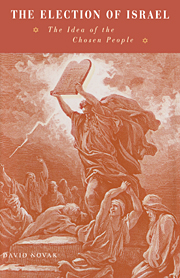Book contents
- Frontmatter
- Contents
- Preface
- List of abbreviations
- General note
- Introduction
- 1 Spinoza and his challenge
- 2 Hermann Cohen's concept of election
- 3 Franz Rosenzweig's return to the doctrine
- 4 The retrieval of the biblical doctrine
- 5 The rabbinic development of the doctrine
- 6 Two medieval views of election
- Conclusion
- Appendix 1 Some major Jewish thinkers cited
- Appendix 2
- Appendix 3
- Appendix 4
- Bibliography
- Index
Appendix 3
Published online by Cambridge University Press: 18 December 2009
- Frontmatter
- Contents
- Preface
- List of abbreviations
- General note
- Introduction
- 1 Spinoza and his challenge
- 2 Hermann Cohen's concept of election
- 3 Franz Rosenzweig's return to the doctrine
- 4 The retrieval of the biblical doctrine
- 5 The rabbinic development of the doctrine
- 6 Two medieval views of election
- Conclusion
- Appendix 1 Some major Jewish thinkers cited
- Appendix 2
- Appendix 3
- Appendix 4
- Bibliography
- Index
Summary
In early rabbinic teaching, there does not seem to be any clear distinction between “the days of the Messiah” (yemot hamashiah), “the resurrection of the dead” (tehiyyat ha-metim), and “the world-to-come” (olam ha-ba – see, e.g., M. Avot 2.16). Moreover, even in later rabbinic teaching, where such distinctions are made (see B. Berakhot 34b), all these realms are constituted as temporally transcendent. This is the case even with olam ha-ba (see Y. Yevamot i5.2/i4d re Ps. 140:8). It is not seen as an eternal, unchanging, preexistent realm as it is for Maimonides (see Mishneh Torah: Teshuvah, 8:8; cf. note of Rabad thereon re B. Sanhedrin 97a on Isa. 2:17, and Novak, The Theology of Nahmanides, 129).
The inclusion of the idea of eternity in Jewish theology, whatever its historical origins might be, presupposes the notion of divine unchangeability. That notion, however, is neither biblical nor rabbinic (see Franz Rosenzweig, “Der Ewige,” in Kleinere Schriften, ed. E. Rosenzweig [Berlin, 1937], 197). Thus the verse, “I the Lord do not change (lo shaniti)” (Mai. 3:6) does not mean that God does not change in the context of his covenantal relationship. For if that were the case, God could not respond to his covenantal partners, which is an essential aspect of covenantal mutuality. Response is a transitive act (see Gen. 6:6, 8:21; Exod. 32:14; Zech. 1:3). What the verse means, I think, is that God does not change into something else. God never loses his personal identity (see Y. Sanhedrin 1.1/18a re Isa. 44:6).
- Type
- Chapter
- Information
- The Election of IsraelThe Idea of the Chosen People, pp. 262 - 263Publisher: Cambridge University PressPrint publication year: 1995



